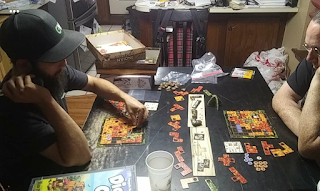Showing posts with label Colosseum. Show all posts
Showing posts with label Colosseum. Show all posts
22 February 2020
The Appeal of Board Games
Not too long ago, I published an article in which I referenced an ex-girlfriend who once told me that I think too much. Specifically, it was in the context of a comparison of casinos to board game cafes, and the differences between board games and gambling. I was reminded of this by two events that recently happened: I attended a friend's party, and a different friend sent me a link to an article about how board games can reduce cognitive decline in old age.
The article does not mention the reason why board games are so beneficial to mental fortitude; it quotes the author of a scientific study as saying 'it is not just general intellectual and social activity, it seems; it is something in this group of games that has this small but detectable association with better cognitive ageing.' Which implies that they don't claim to know why board games improve cognitive function in the elderly.
Sure, I'm no scientist, but I have a pretty good idea what it is about board games that make them so beneficial. Two factors: social interaction and mental engagement.
Labels:
Blokus,
board games are good for you,
Cards Against Humanity,
Cheer Up!,
clans,
Colosseum,
dominant species,
Jorvik,
Munchkin,
social issues,
Telestrations,
thinking,
Warhammer 40K,
X-Wing,
Zombie Dice
13 September 2015
Board Game Review: Colosseum
It's time for another board game review, and I've got a good one for you this week. We're going to look at the game Colosseum by Wolfgang Kramer and Markus Lübke, published by Days of Wonder and Edge Entertainment [editor's note: this article was written before the Tasty Minstrel Games version was released. The new edition has some minor additions to the rules, and different artwork, but is otherwise the same]. Players own colosseums in ancient Rome, and are competing to put on the greatest show.
Let's start in the usual place, with the numbers:
Strategy: 3
Randomness: 2
Complexity: 3
Humour: None
Attractiveness: Nice
Average Length of Game Play: 2 Hours
Let's start in the usual place, with the numbers:
Strategy: 3
Randomness: 2
Complexity: 3
Humour: None
Attractiveness: Nice
Average Length of Game Play: 2 Hours
Subscribe to:
Posts (Atom)






